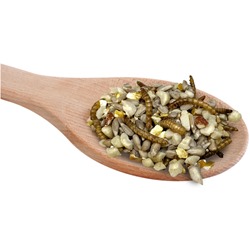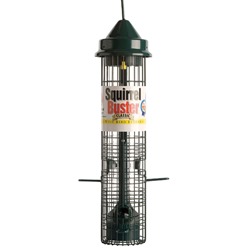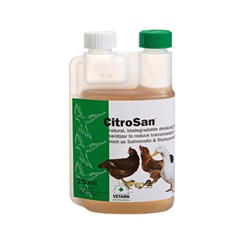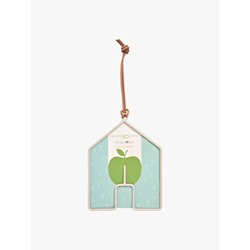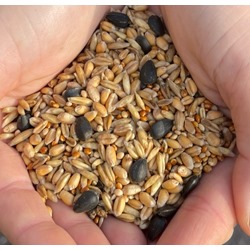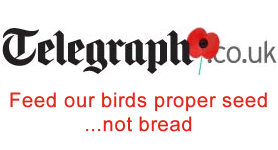
Not so long ago, feeding the birds was simply a matter of hanging up a plastic string of nuts and scattering stale bread. Now, bird tables are groaning under a smorgasbord of Robin Crumble, Finch Mix, insect-flavoured suet blocks and bowls of live mealworms. Even the humble peanut has been overtaken by the sunflower seed in a lofty £180 million bird food industry. Richard and Lesley Smith, owners of the Really Wild Bird Food Company, are one of a handful of producers who sow and grow their own bird seed. Here, on their 400-acre farm, near Bishop's Waltham, in Hampshire, fields of sunflowers light up the downs alongside millet, linseed, oats, rape and wheat. The seed is harvested, cleaned, mixed and packed before being sold online or at the local farmers' market in Winchester.
As a farm diversification scheme, growing and selling bird food seems to have taken off. From its early beginnings with just a few home-grown ingredients and a shovel, The Really Wild Bird Food Company is now in its fourth year of trading, with sales increasing even in the recession. ''Garden birds soon become part of the family,'' says Smith. ''Once our customers start feeding their birds they tend to carry on. They also like the fact that the food is fresh, home grown and fully traceable. All our mixes have been formulated to attract as wide a variety of birds as possible. Our most popular 'original' mix has 13 ingredients.''
To judge by the contents of the sacks, it looks almost edible with plump raisins and crunchy cereals that would not look out of place on the breakfast table. ''High-quality foods like these provide birds with the best nutrients possible,'' adds Smith. ''But we also sell more specific blends aimed at certain bird groups, as well as treats like dried earthworms.'' Robins, apparently, go mad for live mealworms, whose high water content makes them particularly useful in frozen conditions. Ground-feeding birds, such as blackbirds, enjoy raisins, while peanuts will attract woodpeckers. A recent arrival on the menu is the nyjer seed from the ramtil plant, which is popular with finches and siskins, but the universal year-round favourite is the black sunflower seed. Introduced in the Nineties, this seed has transformed bird feeding by providing a high-energy food in an accessible form.
Given the diverse range of crops, it is not surprising that Street End Farm is home to a healthy range of bird life. However, it's not just the seeds that attract them. Wild bird cover, native hedgerows and overwintered stubble all provide much needed habitat for many of our threatened farmland birds. ''In recent years, we have seen significant increases in the number of skylarks, lapwings and English partridges as well as a lot of seed-eating finches,'' says Smith. ''At the last count we recorded as many as 56 different species of wild bird on the farm.''
Lesley Smith, who is also a vet, advises customers to feed different foods in different feeders. ''Some species are ground feeders like the robin, dunnock and blackbird; others such as the tits and woodpeckers prefer to feed from hanging feeders. Spiky bushes such as blackthorn and pyracantha will offer cover from predators and clean water is essential for bathing as well as drinking.''
Unwelcome visitors such as the grey squirrel may be distracted from bird food by nuts in a separate container, or by caged feeders for birds. Smith also advises bird watchers to think like a bird and maintain a 6ft gap around a feeding station so birds can watch for approaching cats.
The latest advice from the RSPB stresses the importance of year-round feeding. In cold weather, a robin needs to eat half its body weight every day. Later, in the breeding season, high-protein foods such as live mealworms are important to make up any shortfall in insect supply. And, even in summer, moulting adults and inexperienced fledglings will welcome an easy food source. ''Bread will fill a bird up, but it is of little nutritional value,'' says Dana Thomas of the RSPB. ''If money is tight, kitchen scraps such as uncooked porridge, cake crumbs or grated cheese are much better.''
The RSPB's annual Feed the Birds weekend acts as a reminder to fill feeders, clean bird tables and put out water for wild birds in the coming months. The swallows and house martins may have gone, but the winter visitors like the redwing and the fieldfare are arriving. Even common garden birds, such as blackbirds and starlings, may have travelled to British gardens from Poland or Russia.
In this year's RSPB Big Garden Birdwatch, the long tailed tit flew into the top 10 of garden birds for the first time, almost entirely as a result of seeds and peanuts provided on bird tables and feeders. It seems that catering for the birds pays dividends.
Feed the Birds Day takes place this weekend, with more than 100 special events across Britain. For further information www.rspb.org.uk
PECK AND MIX
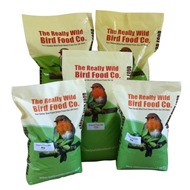
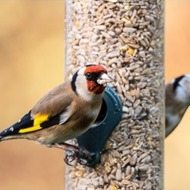 Back
Back Bird Feeders
Bird Feeders  Seed Feeders
Seed Feeders Peanut Feeders
Peanut Feeders Peanut Butter Feeders
Peanut Butter Feeders Suet & Fat Feeders
Suet & Fat Feeders Window Feeders
Window Feeders Hanging Feeders
Hanging Feeders Feeding Stations
Feeding Stations Ground Feeders
Ground Feeders Easy Clean Feeders
Easy Clean Feeders Bird Tables
Bird Tables Seed Trays
Seed Trays Bird Baths & Drinkers
Bird Baths & Drinkers Feeder Accessories
Feeder Accessories Feeder Hygiene
Feeder Hygiene Squirrel Proof Bird Feeders
Squirrel Proof Bird Feeders For the Kids
For the Kids Niger Seed Feeders
Niger Seed Feeders Mealworm Feeders
Mealworm Feeders Bird Food Storage
Bird Food Storage Fat Ball Feeders
Fat Ball Feeders Tube Feeders
Tube Feeders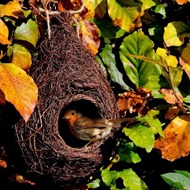



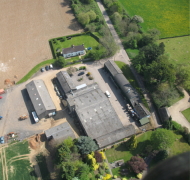 Our Farm
Our Farm Contact Us















